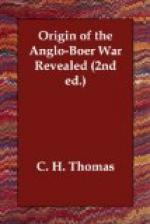DISLOYALTY OF COLONIAL BOERS
The Boer section in the Cape Colonies represents nearly one-half of the white population there. Their representatives in the administration were ever profuse and assertive in professions of loyalty to the Queen and to the English Government, and any aspersions to the contrary were always indignantly and stoutly repelled. The Afrikaner Bond was averred to include nothing to clash with loyal sentiments, no severance from England, but, on the contrary, that its principal objects were to strengthen the lines of amity and joint solidarity in view of a general federation of South Africa upon Imperial bases. In support of such sentiments one of the first acts of the Bond party when recently come into power was a vote of L30,000 per year towards British naval outlays, and in grateful recognition of naval protection; it was at the same time mooted, in fact almost pledged, that the Transvaal would similarly offer L12,000 as well.
The sequel has proven these to be Athenian gifts, for no sooner had the Republican commandoes invaded the Cape Colonies in November last than those identical men enthusiastically welcomed the Queen’s enemies as their friends and deliverers from hateful English dominion. There they stood—self-avowed and unmasked traitors. Members of the Legislative Assembly met those Boer invaders with addresses and speeches, assuring them of their own and of every other true Afrikaner’s aid and fidelity in their common cause. “The star of liberty,” they said, “had arisen at last—it had been the nation’s desire and prayers during the past fifteen years.” “He could thank God with tears of joy for having granted those prayers.” Such were the words of Mr. van der Walt, M.L.A., uttered at Colesberg. Mr. de Wet, M.L.A., Mr. van den Heever, M.L.A., and other colonial notables were spokesmen in similar terms of enthusiasm on other occasions as the invasion advanced. All this is sadly notorious, but still it seems a hard task to convince people who prefer to remain blind or only see a presumptuous adversary in any one who seeks to enlighten them upon this glaring and premeditated treachery.
October and November were months of unrestrained exultation to the Boer party, to judge from letters and articles which appeared in the Standard and Diggers’ News, Johannesburg, dated 22nd November, 1899, and in the Pretoria Volksstem, dated 20th November, 1899.[10] There one sees the mask off, in language of defiant insult and of scurrilous mendacity against all that is English, avowing that the present Anglo-Boer War has been the outcome of preparations during the past thirty years. That letter is not all suitable reading for the tender sex, but should serve as evidence to the still unconvinced sceptic that the Boers are fighting for something more than their mere independence and liberty, viz., for conquest and the domination




